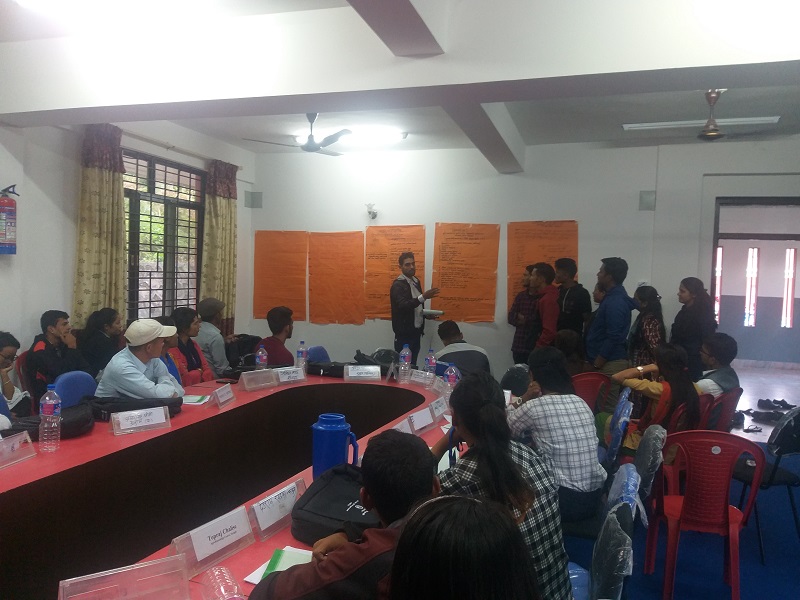Strengthening local capacities for climate-smart agriculture: Insights from Nepal
Strengthening local capacities for climate-smart agriculture: Insights from Nepal
Aastha Bhusal and Laxman Khatri from the Nepali NGO LI-BIRD share their first-hand insights of how farmers are gaining knowledge of climate-smart practices and boosting their communities’ resilience in Gandaki province, Nepal.
Climate change poses a serious threat to Himalayan agrarian economies, especially in a country such as Nepal where 66 percent of the population is directly engaged in farming and rearing of livestock. There is growing concern in the country about the impact of climate change on productivity and efficiency in the agricultural sector.
As a result, the federal, provincial and local governments in Nepal are in the process of developing their own polices, guidelines and programmes that are relevant to local needs and priorities to tackle the challenges posed by climate change. The provincial and local governments, in particular, are taking initiatives to promote sustainable growth in agricultural output as a means to reduce poverty, and to generate more income and local employment opportunities.
A key government initiative is the Chief Minister’s Environment Friendly Model Agriculture Village Programme (CMEFMAVP), launched by the newly established Gandaki Province. The programme is being led by the Ministry of Land Management, Agriculture and Cooperatives, which is implementing it in 36 selected local government units. The CMEFMAVP is designed to make the communities more climate resilient and promote sustainable farming systems. However, it is becoming apparent that a more intensive package is required to support capacity building in climate-smart agricultural technologies and to develop climate-smart villages at the local level.
Climate-smart agriculture
A fundamental issue is that the frontline staff involved in CMEFMAVP lack the requisite information on measures to improve community resilience, as well as insights and concepts of specific climate-smart agricultural technology and practices applicable in different agro-ecological regions of Nepal.
While an efficient mechanism is needed to implement and scale up the programme, it is also important to integrate successful Climate-Smart Agriculture models, technologies and practices into the fiscal plans and policies of provincial and local governments to promote climate-compatible agricultural development, as per gender equality and social inclusion principles.
Currently, farmers in Gandaki province are exploiting natural resources and adopting unsustainable agricultural practices such as haphazard use of chemical fertilisers, which is degrading the soil quality and fertility. These regions are also suffering from various climate hazards. For instance, villages located in the higher altitudes are exposed to hazards such as drought, landslides and hailstorms. Similarly, the Terai region is vulnerable to floods, cold waves and drought. These hazards have negatively impacted agricultural production and productivity, which ultimately affect the income and food security of the people. Lack of information on adaptive strategies for tackling these climate hazards and their impact on crops thereby increases soil vulnerability, affecting farming communities in different agro-ecological regions.
Collaborative action
Keeping in mind all these issues, Local Initiatives for Biodiversity, Research and Development (LI-BIRD), a non-profit making non-governmental organisation in Nepal, is supporting the Gandaki provincial government in implementing climate-compatible agricultural development practices and techniques. Capacity building programmes on climate-smart agriculture– aimed at strengthening the technical knowledge of the CMEFMAVP staff – have raised awareness of locally adaptive agricultural practices among the staff and farmers. The overall methodology has focused on institutional integration, and has provided local solutions based on different agro-climatic conditions, women-sensitive agricultural technologies, and techniques to improve communication and dissemination of climate-smart agricultural practices.
Activities to provide information and hands-on experience to technical staff for developing smart agricultural plans are being conducted in collaboration with the Ministry of Land Management, Agriculture and Cooperatives, Gandaki Province and Agriculture Commercialisation Promotion Support and Training Centre, Pokhara. Discussions were carried out to understand the challenges in implementing climate-smart agricultural strategies.
Based on the learnings, information on best adaptable practices in the agriculture sector, especially women-friendly tools that help to reduce their workload (time and energy), were disseminated to improve the implementation of CMEFMAVP in the province. These tools include the hand-held corn sheller, jab planter and millet thresher: these reduce the drudgery of women farmers and allow them to work more efficiently and quickly. Local solutions are also designed to provide information on climate-smart technologies and identify the best practices in agriculture and the livestock sector, according to the agro-climatic conditions.
Ensuring sustainability
To ensure the sustainability of the climate-smart agriculture strategies, it is important that they are communicated and disseminated among local, provincial and national-level agencies and institutions. The training programmes discussed policies that support smart agricultural practices and approaches and their present status in the three-tier system of government -- in order to help farmers’ groups, cooperatives and other stakeholders get the real picture, before starting the planning and project designing processes.
Gender also plays a key role in maintaining the sustainability of agricultural practices. Women are more involved in agricultural work, ranging from sowing of seeds to the harvesting of crops, in their farms. However, their physical burden needs to be reduced to strengthen their involvement in the farming systems. In Gandaki province, women farmers, with support from LI-BIRD, have been adopting climate-smart agricultural practices such as home gardens, better management of cattle sheds and farmyard manure, use of small machines and equipment and polyhouse farming, along with drip irrigation and vegetable cultivation.
Information and Communication Technologies (ICT) are another important component of the overall strategy to promote climate-smart agriculture. The use of ICT, especially of mobile apps to access information on agricultural practices, has helped the CMEFMAVP team to prepare holistic climate-smart plans for different agro-ecological regions. It also provided an insight into the challenges on the ground. The recommendations were based on these learnings. The team will also assist local governments, institutions, practitioners and farming communities to understand and implement climate-adaptive and smart agricultural practices to ensure sustainability and climate resilience.
Images: farmers studying crop (upper right) and in school (above), courtesy LI-BIRD.

